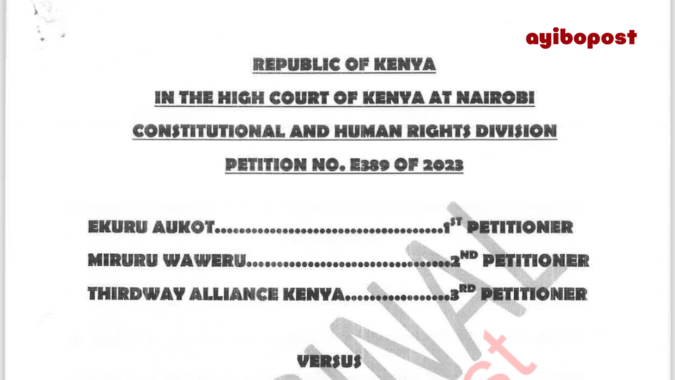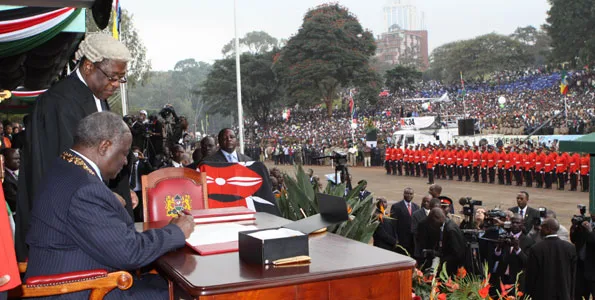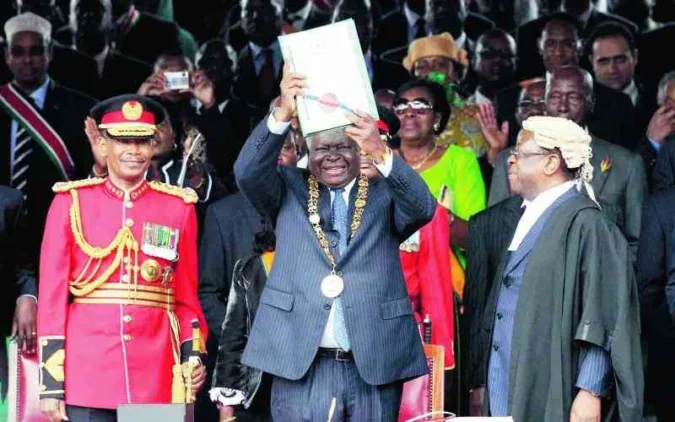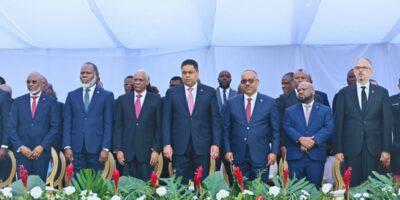The absence of a definition for the term “national force” in the Constitution of Kenya adopted in 2010 opens the way to disputes over the intervention of the Kenyan police in Haiti
In the judgment prohibiting the deployment of Kenyan police officers in Haiti released on January 26, 2024, Judge Enock Chacha Mwita draws two seemingly contradictory conclusions.
According to Mwita, Kenyan police officers can legally be deployed outside Kenya contrary to interpretations by President William Ruto’s political opponents.
However, according to the judge, the government’s desire to send the country’s police officers to Haiti violates the Constitution, according to a version of the court document received by AyiboPost.

Click here to access the full document.
This provisional judgment interprets Article 240 (8) of the Kenyan Constitution adopted in 2010 and invoked by the government to justify the deployment.
This article allows the “National Security Council” headed by the President of the Republic to deploy “national forces” outside of Kenya for peacekeeping or other operations at the regional or international level, with the approval of Parliament.
The concept of “national forces” is mentioned only in Article 240 (8) of the Constitution, and this founding text does not provide any practical definition for the term.
This lack of definition forces the courts to interpret the concept, in order to decide between the Kenyan government, political opponents and the Kenyan Bar Association in this matter.
The concept of “national forces” is mentioned only in Article 240 (8) of the Constitution, and this founding text does not provide any practical definition for the term.
According to the government, the “national forces” are what Article 239 of the Constitution calls the “national security organs” which consist of the Defense Forces, the national intelligence service, and the national police service.
Judge Mwita rejects this interpretation. He admits in his judgment that the term “national forces” is not defined by the Constitution. However, the judge explains, Kenya has no forces other than the « Defence Forces », including the Army, the Air Force and the Naval Forces, which are also called the military.
“Of the three national security organs mentioned in Article 239 (1), only the Kenyan Defense Forces constitute a “force”, the judge continued. The other two national security organs (the intelligence service and the national police service) are services.”
Also, continues the judge, “no one can legitimately argue [as the government does] that the national security organs are national forces.”
It is therefore on the basis of this interpretation that the judge rules in favor of the opposition. According to him, the police are not part of the “national forces”. Moreover, only the army can be deployed outside of Kenya following approval from Parliament under Article 240 (8).

In August 2010, the President and Commander-in-Chief of the Armed Forces of the Republic of Kenya promulgated the new constitution. | © Manje Media
According to the judge, Article 240 (8) of the Constitution does not grant the President the power to deploy the Kenyan Police outside of the country.
However, the “National Police Service Act” released a year after the adoption of the 2010 Constitution outlines a procedure allowing Kenyan police officers to intervene in a foreign country to assist their police in the event of “a temporary emergency” in a context of reciprocity.
According to Articles 107 to 109 of this legal text, the President of Kenya must first declare the state in question a “reciprocal country”. This declaration must be published in the official “Gazette”.
Opponents of President William Ruto had asked the judge to declare these articles “unconstitutional”. A request categorically rejected by the judge.
According to the latter, if Article 240 (8) invoked by the presidency does not allow it to deploy Kenyan police officers outside of the country, there are no articles in the Constitution stating unequivocally that the police officers can never serve abroad.
According to the judge, Article 240 (8) of the Constitution does not grant the President the power to deploy the Kenyan Police outside of the country.
The provisions allowing the deployment of police officers externally in the “National Police Service Act” are based on Articles 238, 239, 243, 244 and 247 of the Constitution, according to the judge.
Specifically, Article 238 of the Constitution of Kenya defines the principle of national security, which is the protection against internal and external threats to the territorial integrity and sovereignty of the country, its people, rights, freedom, prosperity, property, peace, and other national interests.
Theoretically then, Kenyan police officers could be deployed to a country like Haiti under Article 238 of the Constitution, and not on the basis of Article 240, according to the ruling. To do this, the government should argue that its action will promote national interests, or protect the country against internal and external threats.
The bar association, which opposes the deployment in Haiti on the basis of Article 240 (8) supports the judge’s interpretation.

In August 2010, the President and Supreme Commander of the Armed Forces of the Republic of Kenya ushered in the new constitution. | © Ministry of Defence – Kenya
To be lawful, any deployment governed by Article 238 of the “National Police Service Act” must follow the procedures set out in this text.
There can be no legitimate deployment of police officers in Haiti under cover of this law without compliance with sections 107 and 108 of this legal text, which require the country to be declared reciprocal in terms of security, with the publication of this decision in the « Gazette », according to the judge.
However, the bar association and political opponents contend that Haiti has no “reciprocal” arrangement with Kenya and no similar decision has been published in the official journal.
In summary, the article in the Kenyan Constitution cited by Ruto’s government in the case of Haiti only allows the deployment of army soldiers outside of the country, according to the judge’s interpretation.
Other constitutional provisions authorize the deployment of police officers abroad, but the government has not mentioned them. In addition, the Haitian case does not meet the reciprocity requirement, as well as publication in the official gazette, required by law.
It is not clear whether William Ruto’s government, which has already obtained approval from the Kenyan parliament for the deployment of police officers in Haiti, will reintroduce its decision, this time invoking other articles from the 2010 Constitution or signing a reciprocity agreement with Haiti.
Read also: L’interdiction d’envoyer des policiers kényans en Haïti provisoirement maintenue
The October 2023 United Nations Security Council resolution speaks of a multinational security support mission (MMAS), of which one country will take the lead, in close cooperation and coordination with the Haitian Government. Nothing in this document seems to require that this “operational support” to the Haitian National Police come from a foreign police force or army, although Article 7 of said resolution asks the States participating in the Mission to “provide specialized skills” particularly in the areas of anti-gang control and “community policing”.
Haiti has no “reciprocal” arrangements with Kenya and no such decision has been published in the official gazette.
Attempts by AyiboPost to interview the Kenyan government were unsuccessful. Immediately after Judge Enock Chacha Mwita’s decision was issued, the government announced that it would challenge it in a higher court.
This case may therefore land in the coming months before the highest court of justice in Kenya, which will have the effect of further delaying the arrival of police forces in Haiti, in a context of the growing power of bandits, and of the additional threat posed by agents of the Protected Areas Security Brigade (BSAP), whose leaders are close to the former police officer, Guy Philippe, convicted for ties to drug trafficking in the United States.
Read also: Guy Philippe at all costs: the BSAP is strengthening and says it is ready for the fight
This court decision is “a victory for me, for the Kenyan people and their Constitution, and for Haiti,” constitutional lawyer Ekuru Aukot told AyiboPost in an interview on January 26.
The political opponent whose party is leading the legal action in the case hopes the ruling will be reaffirmed in higher courts.
For Narok County Senator Ledama Olekina, the judgment reflects Kenyan public opinion, largely opposed to William Ruto’s government’s desire to carry out an armed intervention in Haiti.
“The decision of the High Court of Justice is correct,” judges Senator Olekina. “If it’s the army, yes, but not the police. It is contrary to the Constitution,” declared the elected official.
This judgment, although provisional, represents a further defeat for William Ruto’s government.
This case may therefore land in the coming months before the highest court of justice in Kenya, which will have the effect of further delaying the arrival of the police forces in Haiti…
On the day the ruling on Haiti was released, another court ordered the government to stop collecting payments from a new housing tax imposed by the Ruto Administration.
Analysts interviewed by the BBC see these two decisions and others released against the government as a sign that Kenyan judges remain fiercely independent despite what they see as intimidation attempts on the part of the president.
By Wethzer Piercin, Jérôme Wendy Norestyl & Widlore Mérancourt
English translation by Sarah Jean.
Cover image: A copy of the constitution and other legal texts sit on a table at the High Court in Nairobi, Kenya. | © AP Photo/Ben Curtis
Stay in touch with AyiboPost through :
► Our WhatsApp channel : click here
► Our WhatsApp Community : click here
► Our Telegram canal : click here







Comments